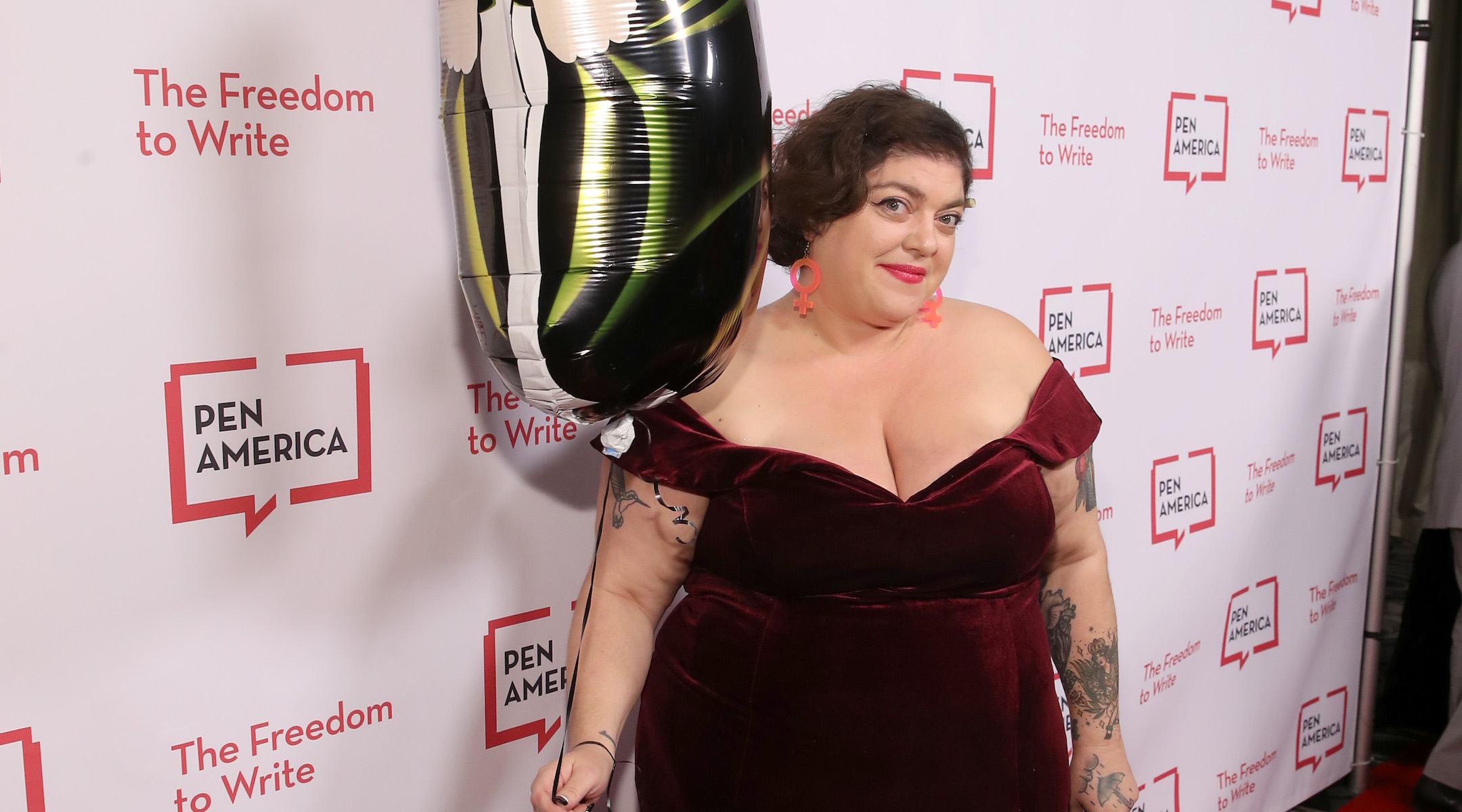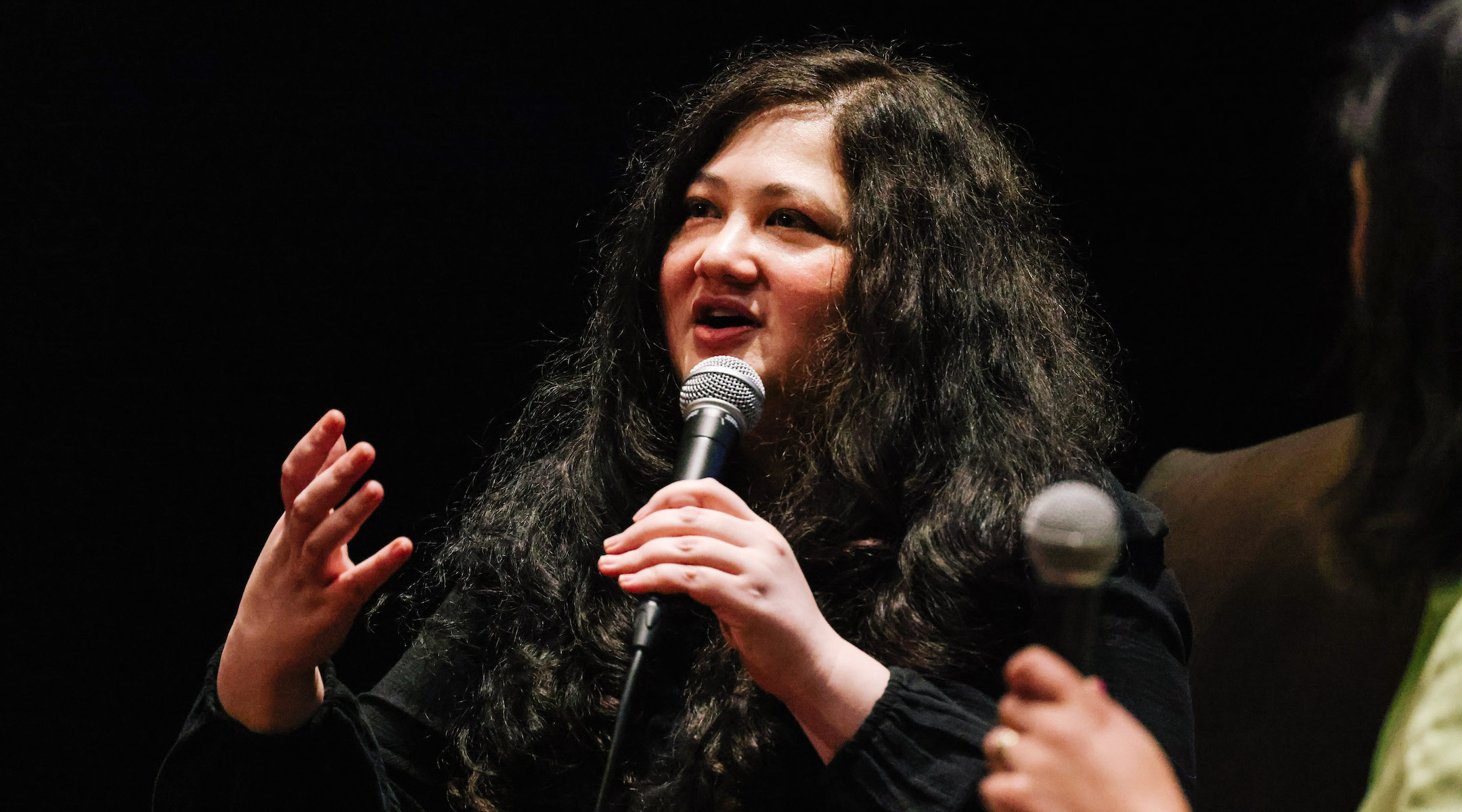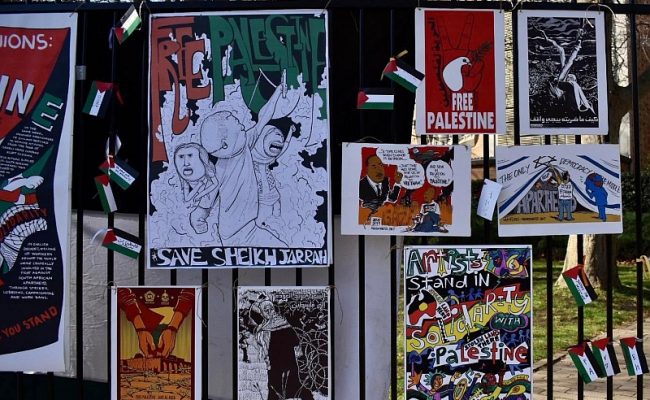((JEWISH REVIEW)) – The Jewish Book Council has launched an initiative to collect reports of antisemitism in the literary world, amid a wave of incidents targeting Jewish creatives during the Israel-Hamas war.
A wave of intense pro-Palestinian activism within the broad literary community has included bestselling Jewish authors being targeted online as “Zionists,” despite not making comments about Israel; protests against pro-Israel writers; and demonstrations at events, such as a major writers conference in Kansas City this week, that have left some Jews feeling intimidated and unwelcome.
The Jewish Book Council’s new initiative, announced Wednesday, asks people to share evidence of alleged antisemitism and promises to maintain anonymity for those who submit.
“We encourage reports of both smaller-scale incidents (such as an individual getting review-bombed because their book includes Jewish content) and larger incidents (such as Jewish literary professionals facing threats of intimidation and violence),” the group said in its announcement. It added, “The hope is that, by reporting and recording antisemitism in the literary world, we can help to put support systems in place for those affected.”
Israel-related controversies across the arts have been abundant since Oct. 7, when Hamas attacked Israel and triggered the ongoing war. Prestigious literary prizes, leadership at the Jewish New York cultural center 92NY, major awards ceremonies and the staff of Artforum magazine have all been upended by the four-month war, with more incidents accruing by the day.
What is happening in the literary world, according to some close observers, stands out for its intensity. Erika Dreifus, a New York City writer who tracks opportunities for Jewish writers on her website, said the new incidents have amplified anti-Israel sentiment in the literary world that she said frequently veers into antisemitism.
“As with so much else, since Oct. 7, everything is really magnified and there’s just been tidal waves where before you maybe just saw puddles,” Dreifus said. “You see it in all genres. And you see it in all countries. … If you make an effort to look around, it’s pretty obvious that it’s everywhere.”
Just this week, the actor Brett Gelman had book signings in San Francisco and Illinois canceled this week, and said he had been the victim of antisemitism. The owner of the San Francisco bookstore that canceled Gelman’s appearance said it was because the “Stranger Things” and “Fleabag” star had made “intemperate and ill-advised remarks that he made against some other ethnic and social groups”; Gelman — who has visited Israel, appeared on its leading sketch-comedy show mocking antisemitism in the Bay Area, and advocated for it on social media since Oct. 7 — said he had disparaged only Hamas and antisemites.
Brett Gelman and Ari Dayan attend Netflix’s “Stranger Things” Season 4 New York Premiere at Netflix Brooklyn, May 14, 2022. (Theo Wargo/Getty Images)
Last week, hundreds of writers demanded in an open letter that the free-speech organization PEN America release a statement about Palestinian writers killed in Israel’s counteroffensive in Gaza and “name their murderer: Israel, a Zionist colonial state funded by the U.S. government.” They say that if PEN does not “take an actual stand against an actual genocide,” the group should disband.
The letter follows an incident last month when PEN America rejected calls to cancel an event with the Jewish celebrity Mayim Bialik over criticism of her support for Israel. A leading pro-Palestinian literary activist, Randa Jarrar, was forcibly removed from the event for protesting during it.
Bialik, the former star of “The Big Bang Theory” and until recently a host of “Jeopardy!”, is one of the most prominent Jewish and pro-Israel voices on social media. Much of her content since Oct. 7 has focused on calling attention to the plight of the Israel hostages held in Gaza and decrying sexual violence perpetrated by Hamas and, like many other pro-Israel Jews on social media, she has participated in efforts to direct support to Israeli soldiers.
Some of her content has generated criticism. Last year, she made several videos with Noa Tishby, a pro-Israel activist who has worked with the Israeli government, in which she rejected the idea of a ceasefire, a top demand of pro-Palestinian activism that Israel rejects because it would leave Hamas in place. Late last month, after Bialik posted a video of herself laughing at Jewish comedian Dan Ahdoot’s bit about Israeli history, her critics said she was trivializing a conflict in which tens of thousands of Palestinians have died.
For some pro-Palestinian writers, merely staging an event with Bialik — who was set to interview Jewish comedian Mosher Kasher about his new book — marked PEN as an apologist for genocide.
Two award-winning authors, Angela Flournoy and Kathleen Alcott, broke ties with the group over the event, saying that PEN America was platforming “a hugely influential racist who has incited ongoing slaughter.”
Flournoy, author of “The Turner House” and a National Book Award finalist, and Alcott, the O. Henry Prize-winning author of “Emergency,” withdrew from a different PEN event in protest. Fluornoy said in a message she later shared on Instagram that they were protesting “the organization’s reluctance to take a stand against the genocide in Palestine, and particularly the targeting of writers, journalists and artists.”
She added, “There is a difference in an organization remaining impartial — a dubious policy itself during a genocide — and what is happening at PEN right now.”
In addition to criticizing Bialik, the authors also expressed concern that PEN was partnering on the Bialik-Kasher event with Writers Bloc, a Los Angeles literary events organization run by a Jewish woman that had canceled a planned event with the author Nathan Thrall in the weeks following Oct. 7.
Andrea Grossman had canceled the planned talk with Thrall, a Jewish author whose new nonfiction book “A Day In The Life of Abed Salama” deals critically with Israel’s military occupation of the West Bank, over what she said were concerns that “the community is deeply polarized” and that it would be irresponsible to “promote a program on this subject to a largely Jewish audience when people on all sides are being bombed, killed and buried.”
Thrall and several other pro-Palestinian authors criticized the decision at the time. For a free-speech group like PEN to now partner with the same organization, Flournoy and Alcott believed, was hypocritical. “The choice to partner with an organization who deems writing that humanizes Palestinians as ‘too polarizing’ is particularly confounding given PEN’s own statement against canceling similar events,” Flournoy wrote.
The Bialik-Kasher event went ahead anyway on Jan. 31, with Writers Bloc, and was disrupted by protesters representing the group Writers Against The War on Gaza. The group drew attention to the nearly 100 writers and journalists believed to have been killed by Israeli forces in Gaza since the war began.
One Egyptian-Palestinian author and professor, Jarrar, refused to leave the event and was removed by security; Jarrar later harshly criticized both PEN and people she referred to only as “Zionists” on social media. (The author of the novel “A Map of Home” and a professor at California State University at Fresno, Jarrar has been the subject of controversy in the past for writing in 2018, “At some point, all of us in the literary community must DEMAND that white editors resign.”)

The author Randa Jarrar at the 29th Annual PEN America LitFestGala on November 1, 2019 in Beverly Hills, California. On Jan. 31, 2024, Jarrar disrupted a PEN America-hosted author event over her objections to presenter Mayim Bialik’s Zionism. (Photo by Randy Shropshire/Getty Images for PEN America)
PEN rejected Jarrar’s criticism. “When it comes to public events, the open exchange of ideas cannot devolve into an environment where only the loudest voices are heard, about the event’s protesters,” Allison Lee, the group’s Los Angeles director, said in a statement. Bialik declined to comment to (JEWISH REVIEW).
Jarrar was also connected to pro-Palestinian disruptions at the annual conference of the Association of Writers and Writing Professionals earlier this month in Kansas City. She did not attend, but before the conference, a group called the Radius of Arab American Writers, which has counted Jarrar among its leaders, sent a message to all event moderators urging them to read a pro-Palestinian statement before their events.
“The event organizers would like to acknowledge that we are gathering during an active genocide taking place in Gaza,” the suggested statement starts, before noting that the war follows “decades of colonial violence under Israel apartheid.” The statement also expresses solidarity with Indigenous people, victims of genocides in Africa, Black people and LGBTQ+ people.
The conference organizers responded by saying the call had not been sanctioned and that the conference was committed to being “free of harassment, fear, intimidation, or ridicule,” without offering any specific concerns, drawing another round of criticism from the Arab American writers group.
Then, during the conference, the group staged a two-hour protest calling for a ceasefire. The demonstration took place in communal spaces, such as a book fair and exhibition hall, and did not target any of the many sessions of Jewish interest on the conference agenda. Still, some attendees felt intimidated by the experience and said they would be registering their unhappiness with the conference’s organizers, according to a discussion in a prominent Jewish women’s writers Facebook group shared by multiple people with (JEWISH REVIEW). (Some Jewish writers also participated in the demonstrations.)
Anti-Israel sentiment in the literary world is taking place online, too, particularly in the robust world of #BookTok, the corner of TikTok where books are discussed and that is seen as increasingly influential over commercial success in publishing, and on the Amazon-owned book review site Goodreads, where “review bombing,” or flooding an author’s book page with negative reviews, is a common practice.
Among the top targets of Israel’s critics among online readers have been Gabrielle Zevin and Sarah Maas, best-selling authors with engaged fan bases who themselves have not commented publicly about the war.

Author Gabrielle Zevin speaks about her bestselling novel “Tomorrow, and Tomorrow, and Tomorrow” during the 28th Annual Los Angeles Times Festival of Books at the University of Southern California, April 22, 2023 in Los Angeles. (Dania Maxwell/Los Angeles Times via Getty Images)
In December, Zevin was the subject of a social media pressure campaign to prevent a special edition of her novel “Tomorrow, and Tomorrow, and Tomorrow” from being promoted by the fantasy subscription service FairyLoot. People on social media had called Zevin a “Zionist” — for critics of Israel, a pejorative — because her book about video game designers features an Israeli character and because she has participated in events with the Jewish women’s group Hadassah, an explicitly Zionist organization. Zevin has a Jewish father and a Korean mother and has said she does not have a religious identity.
FairyLoot called the online accusations “completely unfounded” and rejected the demands.
“Gabrielle Zevin is a well-established, award-winning author whose work has consistently been met with critical and commercial success and we deeply regret she has been exposed to these attacks on her character and integrity,” the company said in a series of social media posts, without specifying what the attacks were. The company did not respond to a request for clarification.
Maas, too, has drawn scorn from BookTokers, largely because of a 2016 interview in which she cited her experience on a Birthright trip to Israel as influential. Maas, who has sold more than 30 million books worldwide, is Jewish and has family members who survived and died in the Holocaust; her fantasy romance series “A Court of Thrones and Roses” borrows from Jewish themes and frequently appears on banned-books lists.
Some TikTokers who review books for their followers have said over the last four months they will no longer read or include Maas’ work because she is a “Zionist.” At least one has burned a Maas book in protest.
Whether the dynamics are costing Jewish writers contracts or sales is not clear, and both FairyLoot and PEN America did not give in when they faced anti-Israel pressure. But Dreifus said the cumulative effect of the statements, demonstrations and criticism is that Jewish writers with an affinity for Israel increasingly feel isolated within what has been a tight-knit literary community.
She maintains a public list of literary groups’ statements on Israel. Starting immediately after the Oct. 7 attack, she chronicled a flurry of statements from journals and literary organizations condemning “genocide” in Gaza, calling for “intifada,” and using the phrase “From the river to the sea,” which many Jewish groups view as a call for Israel’s destruction. One major online publication that aspires to be a clearinghouse for the community, Literary Hub, has published a steady drumbeat of content that is sharply critical of Israel, and nothing criticizing the attack on it.
“I’m gleaning — and it’s not just me — that there are fewer and fewer literary venues where people may feel comfortable sending their work or having their work appear,” Dreifus said. “For me, it certainly distances me from any sense of really belonging to a wider literary community.”
Other writers say they are feeling the weight of months of tension. In a recent Facebook post, the Jewish romance author Jean Meltzer said her agent intervened after someone panned her forthcoming book on Netgalley, a prerelease site, because she was “a Zionist.” (She also noted that she had drawn criticism from her fans for promoting the work of an author who had criticized Israel.)
“If you want to know THE TRUTH, it’s hard right now to be an out-loud and proud Jewish author,” Meltzer wrote. “All over publishing, Jewish authors are being targeted.”
The Jewish Book Council says it believes that more attention to antisemitism in the literary world is essential to curbing it.
“Thank you for helping to bring awareness to this important issue,” it said in its announcement of the antisemitism reporting initiative. “Prejudice in our communities can be excised through unity, care, and togetherness.”




